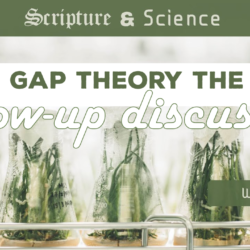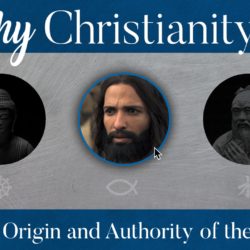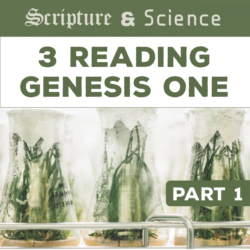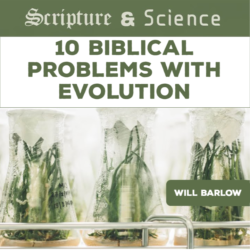Colossians 1.15 presents an interesting test case to examine translation bias. Well-meaning Bible students have taken this text in at least three different ways. However, some translators, motivated by a fear that readers might see Christ as a member of creation, have increasingly pushed for translating this text so that it says Christ is superior to all creation and thus on the creator side of the creator-creature divide. In what follows I examine several popular translations and discuss the two main issues in this verse.
—— Books ——
- A Greek-English Lexicon of the New Testament and Other Early Christian Literature, 3rd Edition (BDAG)
- Greek Grammar Beyond the Basics by Daniel Wallace
- Truth in Translation by Jason David BeDuhn
—— Links ——
- Colossians 1.15-20: Preexistence or Preeminence by William Wachtel (paper)
- Christ the Firstborn Head of the Universe by Nathan Crowder (paper)
- Explanation of Colossians 1.15 -20 by John Schoenheit (from One God & One Lord)
- Resurrection Impact by Sean Finnegan (audio sermon on Colossians 1.15-20 as ascension theology)
- Debate: Patrick Navas vs. James White on Chris Date’s Theopologetics Podcast (part 2 addresses Colossians 1)
- Check out all the lectures in How We Got the Bible
- See what other classes are available here or on the Restitutio Classes podcast (subscribe in Apple, Spotify, RSS feed)
- If you’d like to support Restitutio, you can donate here.
- Intro music: Good Vibes by MBB Attribution-ShareAlike 3.0 Unported (CC BY-SA 3.0) Free Download / Stream: Music promoted by Audio Library







Hello Sean, I just wanted to let you know how truly blessed I’ve felt listening to these bible classes and actually all of your podcasts. I have shared this information with multiple people about our bibles and you would be amazed at how much misinformation these people actually believe. I even have a close family member who is a preacher and had no idea about John 7:53-8:11 not being in the manuscripts! I feel like this topic is so important and I’m so glad to see you devoting so much time and effort into this. I can’t wait for Saturday’s episode!
Thanks Sean. Very thorough, honest, and balanced. I like your critical thinking.
I would like to probe your opinion regarding the statement, “firstborn of all creation” a bit further if that is OK. It seems apparent that the etymology of the noun “firstborn” prototokos is a compound of proto (first) and tokos (produced). The literal meaning of the word is the first one in sequence procreated from a parent. While “proto” can sometimes refer to first in superiority, by compounding it with tokos (produced) it doesn’t seem to make much sense if “proto” is interpreted as superior. Wouldn’t that literally mean “superior production?” I take your point that sometimes the inheritance blessing of the “first-produced” is occasionally given to another, but does that make him the “prototokos?” Were Isaac, Jacob, or Ephraim actually ever called “prototokos?” Isn’t the older brother still literally the “prototokos” even if he lost the inheritance blessing? Doesn’t this tend to favor the more literal meaning unless there is overwhelming evidence in the context to the contrary? Also, do you agree that first in sequence is normally what makes one first in rank?
Secondly, in the vast majority of occurrences in the LXX and NT prototokos is clearly meant literally, the first-procreated child of a parent. Would you agree that the interpreter ought to give much more weight to the literal and common understanding of the terminology over very rare and perhaps questionable counter-examples? You are right that translator bias is a big problem. But what about interpreter bias, where extremely rare exceptions, perhaps occasional figurative usage, are imported by interpreters in order to make a passage confirm the interpreters own biases (when in fact it reads just fine literally, in conformity to common usage)?
Thanks, Tim
Sean,
I would like to add one point to my questions above. Wallace (GGBB, pp. 103-104) makes the point that when a genitive is to be understood as a genitive of subordination, the noun that it modifies necessarily implies some kind of dominion, such as “king” or “governor.” This is what makes it a genitive of subordination. For example, in the clause “king of Israel,” the genitive “of Israel” is understood as a subordinate genitive because “king” requires it. As a Trinitarian, Wallace (on p. 104) attempts to defend the “over all creation” reading of Col. 1:15, because without this the Son’s origin is linked to the beginning of creation week and this clashes with his co-eternal understanding of the Son. In his attempt to qualify “prototokos” as having this implicit idea of ruling authority over a dominion he lists 1 Chron. 5:1; Psalm 89:27; Rom. 8:29; Rev. 1:5 as evidence of the quality of authority from a “first-produced” son being transferred to another. However, while 1 Chron. 5:1 and Psalm 89:27 apply the treatment of a “first-produced” being given to another, that person is not called “first-produced,” nor is there any indication that he assumes a dominant role over his the true “prototokos.” This because one cannot change birth order after the fact. Also, the quality of being “first-produced” does not seem to imply authority over others, but rather being favored above other siblings by the father. The one being regarded like a prototokos is the recipient of the highest favor from the father especially regarding inheritance. But this does not make him actually and literally “first-produced,” nor does it grant him authority or dominion over his brothers. Next, Wallace’s use of Rom. 8:29 to support the idea of an alleged dominance of a “first-produced” being applied to Christ, assumes what he is trying to prove. That Christ is the “First-produced among many brethren” does not grant the status of being “first-produced” to Him as Wallace supposes, (having dominion), without His actually being the “first-produced” in time. So this example does not support his point. Finally, his use of Rev. 1:5, where Christ is called “first-produced from among the dead” (as in Col. 1:18), ignores the fact that first in sequence is the main point (exactly as in Acts 26:23 “that the Christ would suffer, that He would be the first to rise from the dead…”). Christ’s resurrection does not make Him our superior in our resurrection. He is already our superior. Consequently, “first-produced out from among the dead” refers to first in sequence regarding resurrection to immortality in the same way that “first-produced of all creation” refers to first in sequence in relation to all procreated things within the creation. Making “first-produced” a term of authority instead of a term of birth sequence is not compatible with sound exegesis IMO, but is driven by theological biases, both Trinitarian and Unitarian. Please correct me if I missed something.
Dear Sean – Thanks for this presentation.
Would it be possible to have a future presentation sometime concerning the application of the apostle Paul’s alleged ‘Wisdom Christology’ (as held by scholars such as James D.G. Dunn; and Dr. Dustin Smith), to the verses of Colossians 1:15-17 – which according to these scholars, entirely concerns the Genesis creation, and NOT the spiritual, new creation (which as a subject, only begins to be mentioned in Colossians 1:18-20) ? The basic idea is that originally, God in His ‘Wisdom’ created the world (cf. Prov.8), but personified ‘Wisdom’ became somehow identified with a non-literally pre-existing Jesus Christ (cf. 1 Cor. 1:24, 30), and that Col. 1:15-17 is somehow talking of Jesus Christ being the plan and purpose of the Genesis creation, from the very beginning. Consequently, the power and wisdom of God (God being the sole creator) was also the same power and wisdom of God that was evident in the saving activity of Jesus’ life, resurrection and exaltation.
As I understood it, Jerry Wierwille fairly recently, put forward “Wisdom Christology”, as a means of explaining Hebrews 1:10-12. i.e. God, in His ‘Wisdom’, created the physical universe, but somehow a non-literally pre-existent Jesus Christ was later seen as embodying God’s personified “Wisdom”.
These ideas are rather complex to understand. Would it be possible to have a future discussion with Dustin Smith and/or Jerry Wierwille to better understand how Col. 1:15-17 can be explained via “Wisdom Christology” ?
Hey John,
As it turns out Dustin Smith will be presenting on wisdom Christology at the UCA conference in October. Might I suggest you attend? Information about registration is available at unitarianchristianalliance.org. If you do not attend, you will be able to access his talk several months afterwards as the video editing process takes time and the UCA releases presentations on a staggered schedule. In the future on Restitution, I intend to cover Colossians 1.15 in more detail, drawing on Andrew Perriman’s excellent book, In the Form of a God.
Dear Sean;
Many thanks for your comments.
I think ‘Wisdom Christology’, and its role amongst the interpretative options for explaining Col. 1:15-20 (from a Christian Unitarian perspective) could do with some elucidating. I look forward, Sean, to any of your future work on Col. 1:15-17. God bless you, Sean, and all yours.